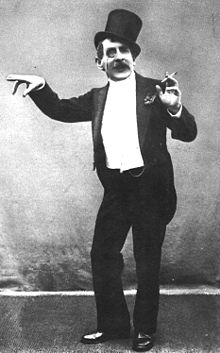Charles Coborn
Charles Coborn | |
|---|---|
 AsThe Man Who Broke the Bank in Monte Carlo | |
| Born | Colin Whitton McCallum 4 August 1852 Stepney,London, England |
| Died | 23 November 1945(aged 93) London, England |
| Occupation(s) | Music hallsinger and comedian |
Colin Whitton McCallum(4 August 1852 – 23 November 1945), known by his stage nameCharles Coborn,was a Britishmusic hallsinger and comedian. During a long career, Coborn was known largely for two comic songs: "Two Lovely Black Eyes", and "The Man Who Broke the Bank at Monte Carlo."
Biography
[edit]He was born inStepney,East London,[1][2]and adopted his stage name from Coborn Road, which feeds ontoBow Road.He made his music hall debut on theIsle of Dogsin 1872, and by 1879 was being billed at theOxford Music Hallin London as "The Comic of the Day".[3]In 1886, he heard AmericanWilliam J. Scanlan's song "My Nellie's Blue Eyes". Liking the melody but not the words, Coborn rewrote it as "Two Lovely Black Eyes", and began performing it regularly wearing a faded frock coat, carrying a battered umbrella and with two blackened eyes.[4]He premièred it at the Paragon Theatre, in the Mile End Road,[5]and the song was instantly successful.[4]
In 1891, he bought the rights toFred Gilbert's song, "The Man Who Broke the Bank at Monte Carlo". When Gilbert first offered the song, Coborn was reluctant to adopt it. In his autobiography he stated: "[I] liked the tune very much, especially the chorus, but I was rather afraid that some of the phrasing was rather too highbrow for an average music hall audience." But when he found that he could not get the chorus out of his mind, he decided to use it.[5]The song became a regular of his act, and he performed it while touring, using different languages for it throughout the world. Coborn later estimated that he had performed the song 250,000 times in the course of his career, and could sing it in 14 languages.[6]Coborn confirmed that Gilbert's inspiration was the gambler and confidence tricksterCharles Wells,who was reported to have won one-and-a-half millionfrancs[7]at theMonte Carlocasino, using the profits from previous fraud.[8][9]
Coborn's other, less successful, songs included "Should Husbands Work?", part of the music hall tradition of (normally conservative) social comment; "I've Loved Another Girl Since Then";[5]"He's All Right When You Know Him"; and "I've Never Turned Money Away", which created controversy when Coborn performed it using thestereotyped manner of a Jewin a Jewish-owned theatre (he apologised afterwards, but was banned from appearing in the venue again).[4]
He toured extensively and performed in New York City andTorontoduring 1900. Described as a 'literate man of high principles', he was never accepted completely by the music hall establishment, but performed much charitable work during theFirst World Warand later as an effort to improve the conditions of music hall entertainers.[4]He continued to make occasional performances, including a one in the 1943 movieVariety Jubileeat the age of 91. He died in London in 1945.[3][1]He is buried with his wife inBrompton Cemetery,London.
Recordings that he made during the 1920s can be found on the albumChairman's Choice – Music Hall Greats.[10]
His eldest son, MajorDuncan McCallum,becameMember of ParliamentforArgyllshire.
Selected filmography
[edit]- Say It With Flowers(1934)
- Variety Jubilee(1943)
References
[edit]- ^ab"Charles Coborn".Rfwilmut.clara.net.Archived fromthe originalon 7 November 2016.Retrieved11 April2017.
- ^"Whitton and Ritch Genealogy from Scotland".Robertwhitton.eu.23 November 1945. Archived fromthe originalon 16 February 2017.Retrieved11 April2017.
- ^abGammond, Peter (1991).The Oxford Companion to Popular Music.Oxford: Oxford University Press. p.122.ISBN0-19-311323-6.
- ^abcdBaker, Richard Anthony (2014).British Music Hall: An Illustrated History.Barnsley: Pen & Sword. pp. 228–230.ISBN978-1-78383-118-0.
- ^abc"cockney history, tower hamlets, east end of london, Charles Coborn, music hall, Bow, Mile End, Victorian".30 October 2007. Archived fromthe originalon 30 October 2007.Retrieved11 April2017.
- ^The Glory of Music Hall, Neil Kellas 2007
- ^The Times,13 July 1893
- ^Michael Kilgarriff (1998)Sing Us One of the Old Songs: A Guide to Popular Song 1860–1920
- ^Coborn, C.: The Man who Broke the Bank at Monte Carlo (pp. 227–8): (London: Hutchinson, c. 1928)
- ^Bill Clark."Chairman's Choice – Music Hall Greats – Windyridge CDR22".Musichallcds.com.Retrieved11 April2017.
External links
[edit]- Charles Cobornincludes two recordings. You can also hear him singing "The Man who Broke the Bank at Monte Carlo",VideoonYouTube
- Charles CobornatIMDb
- Charles CobornatAllMusic
